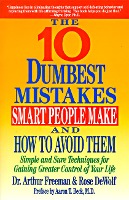ARE YOU A MISTAKE MAKER?Have you ever thought: "I'd better not try, I could be embarrassed"?
Does it bother you to see someone you know get ahead -- of you?
Have you ever thought: "Its my responsibility to make sure my loved ones are happy"?
Is your motto "Anything worth doing must be done absolutely right"?
Do you tend to qualify your responses?
That is, do you find yourself saying: "Yes, its good, but..."?
Have you ever concluded: "Everybody thinks I messed up"?
Have you ever thought: "I just can't lose.
Let's face it, when you've got it, you've got it"?
You, just like everybody else in the world, may be prone to one or many of the ten dumbest mistakes smart people make. Now, Dr. Arthur Freeman and Rose DeWolf offer clear, practical advice and concrete techniques to help you combat selfdefeating thinking and gain greater control of your life, work, and personal relationships. Arm yourself with this one right away.

